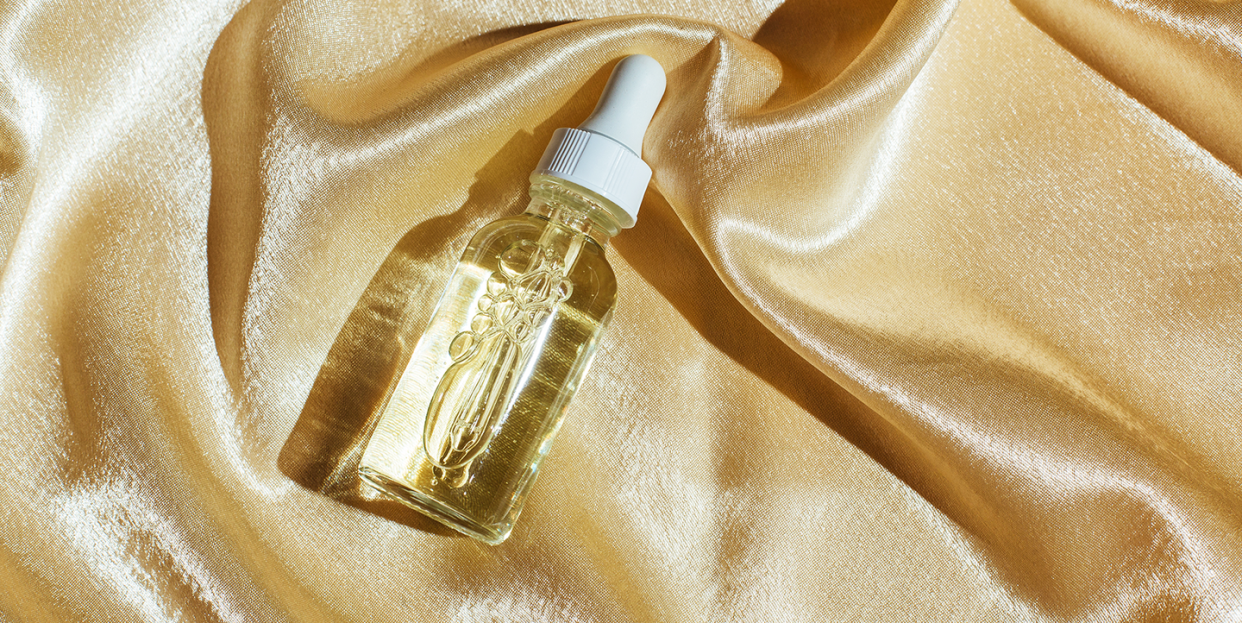Just Some Essential Oils to Better Your Bedtime Routine

Uh, there is literally so much happening in the world right now (*sigh*) that we understand if you're having a lil trouble catching some quality zzz’s. Sleeping well (and through the night) is kind of a gamble (like, I’ve tried everything from ashwagandha gummies to listening to rain on loop to relax) but experts say the best thing you can do to hack your sleep is establish a consistent bedtime routine.
For you, that might mean slipping into some silky sheets or soaking in the tub with some candles lit, some yoga or meditation, or diving into your fave romance novel. It can also look like a lovely aromatherapy moment with a spritz of some essential oils. Just FYI, we’re not claiming essential oils to be a sleeping pill or something that’ll put you right out when you’re having a bout of insomnia. The general goal is to help you unwind after a long ass day, and there are certain essential oils that might be able to help you get there.
Before you get sucked into one of those “Hey girl, wanna make some extra cash???” messages attempting to turn you into an essential oil entrepreneur, read this. We’ll give you the lowdown on the best essential oils for sleep, where you should buy them, and the ideal ways to use essential oils.
Soo, do essential oils help you sleep, y/n?
The answer is…~possibly~. “When used in aromatherapy, essential oils reach the nose and the brain via the olfactory tract,” explains Carleara Weiss, PhD, MS, RN, a clinician-scientist focused on sleep, aging and wellness. “While in the brain, each type of oil has a slightly different mechanism of action; overall, they generate a biological response that involves serotonin and endorphins [aka the hormones that give you a much-needed mood boost], promoting relaxation,” says Dr. Weiss. We’ll get into exactly which oils hit which points in a bit.
In general, certain smells can help you chill out, and are an important part of a relaxation routine, says Rachel Salas, MD, M.Ed., Assistant Medical Director at the Johns Hopkins Center for Sleep and Wellness. The National Sleep Foundation’s research has also found that scent plays a big part in a cozy bedroom environment—specifically, 71 percent of people reported getting a better night’s sleep when they climbed into fresh-scented sheets. “Scent can also be linked to memories, if you have a scent that reminds you of a relaxing time or a location that you find very peaceful,” Dr. Salas adds. You may even be able to incorporate those scents into a meditation, reimagining happy times (think tropical island vacay energy) as part of your bedtime regime.
The best essential oils for rest
Lavender. This is the classic get-ready-for-bed essential oil. Studies back that inhaling it may help with mild sleep disturbances (and can even help reduce anxiety, adds Dr. Weiss).
Chamomile. Here's another herb you can either sniff in oil form or sip in tea. According to research, it contains apigenin, an antioxidant that can soothe inflammation and assist with muscle relaxation.
Ylang Ylang. “This oil comes from the flower of the Cananga tree, and some studies show that it lowers blood pressure and reduces anxiety,” says Dr. Weiss. “The effects on anxiety are beneficial for sleep quality.”
Valerian. You may be a little less familiar with this one. Kinda like lavender, you can inhale valerian oil and it might help you drift off faster and improve your sleep quality, says Dr. Weiss.
Eucalyptus. It's not necessarily a sleep aid, but eucalyptus does help you breathe better, research has proven. “The oil derives from the Eucalyptus tree and alleviates nasal and sinus congestion, clearing the airways for better sleep,” Dr. Weiss says. Pro tip: Inhale some, or stick a big ol' sprig of eucalyptus in your shower and take a dip breath.
How to use essential oils to wind down
First of all, when you're buying essential oils, remember that they're not a prescription for better sleep, and the FDA doesn't regulate them like they do supplements or herbs, Dr. Salas notes. Here are some other things to keep in mind before you inhale...
Check the formula for allergens.
Wait to spritz any essential oils in your linens until you double check that none of the ingredients could activate an allergic skin reaction for you, Dr. Weiss advises (on that note, don't try to DIY an essential oil formula and make sure you buy them from reputable retailers to avoid a bad reaction). And if you have lots of indoor allergies, you may wanna go with an essential oil diffuser. That way, you can refill it daily with essential oil so dust doesn't accumulate, she adds.
You probably shouldn't rub them directly on your skin.
There's not enough research to support that rubbing essential oils on your skin can do anything for your sleep, Dr. Salas says. It's okay to spray or dab a bit on your sheets, but don't go overboard. Over time, your mattress and pillows can get weighed down by oils and other allergens, and those allergens can disrupt your sleep quality, if there's enough of them, according to Dr. Salas.
Incorporate them into a full bedtime routine.
It's not just a whiff of essential oils that'll knock you out. You've gotta wine and dine yourself a bit with self care before bed. Dr. Weiss recommends stopping the scrolling and shutting off your Netflix at least a half hour before going to sleep and spending that time prepping for the next day or doing things like reading or meditating. That's also your sweet spot for using aromatherapy. You can add them into your breathwork during your meditation moments, or you can run a diffuser until your bedroom feels (and smells) like peak coziness, the experts say.
You Might Also Like
